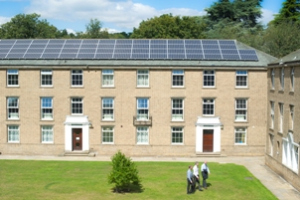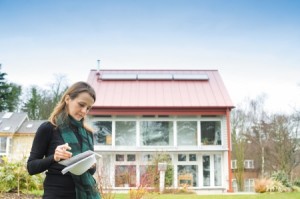April 3, 2013, by sustainablenottingham
Everything’s gone green
Dr Paul Greatrix, Registrar, reflects on positive work on sustainable futures at The University of Nottingham (previously posted on his Registrarism blog).
In 2012 the University of Nottingham won the Times Higher Education Award for Outstanding Contribution to Sustainable Development. In the citation for the award the judges noted Nottingham was a “trailblazer” for environmental best practice.
Now I must admit that I used to be rather skeptical of the idea of ‘greening’ different aspects of university activity. Partly this was down to concern about the additional cost, substantial in many cases, but also doubt that it would have any meaningful impact on sustainability or that prospective students would really be interested in a university’s green credentials.
I got it wrong. This is all for real and it does matter. At the University of Nottingham our sustainability policy has the following aims:
- Improve the environmental performance of our buildings and the University’s physical infrastructure
- Ensure all operations and procurements are sustainable
- Harness the University’s research and teaching strength to improve its environmental performance and advance the environmental agenda
- Contribute broadly to efforts to protect the environment and ensure those efforts get the recognition they deserve.
OK, grand ambitions, but how do these translate into practice? The University has done rather a lot. In terms of travel there has been significant pedestrianisation and cycle lane installation, Ucycle Nottingham and ride-to-work schemes and more public transport and inter-site buses. Moreover, one of the new city tram lines under construction will pass through University park and a parking charging scheme (not universally popular, it has to be said) has been introduced, resulting in a drop in car use.
The grounds management plan has sustainability and increasing biodiversity of campuses as key requirements. The University has won 10 consecutive Green Flag awards and a Green Gown award for sustainability and, in partnership with the Woodland Trust, planted a ‘Diamond Wood’ in Sutton Bonington in 2012. On waste and re-cycling there have been significant improvements in recycling rates, from 4% in 04/05 to 29% in 08/09, and 87% in 10/11.
In terms of carbon management, the University’s Carbon Management Plan (CMP) was approved in 2010 and includes targets for reductions in emissions of CO2 from energy usage. It identifies the principal areas of energy use and investment programmes required to improve energy efficiency, reduce usage and generate energy from renewable energy sources. In its second year the CMP developed 55 projects requiring a total investment of £1.48 million. The overall benefits identified equate to 2,028 tonnes of CO2 and £350k per annum. In 2010/11 there was a 1.7 % decrease in CO2 and this trend continued in 2011/12 with a 2.3% reduction from 67,454 to 65,901 tonnes CO2 a saving of 1,553 tonnes.
Less positively, planning applications for a three turbine wind farm alongside the Grove Farm sports ground appear to have been stymied for the present by some disappointing decisions by Broxtowe Borough and Nottingham City Councils whose green rhetoric has, unfortunately, not been matched by their actions.
The University currently has 14 BREEAM schemes within the system, the highest within the HE sector: seven ‘BREEAM Excellent’ completed buildings, six buildings where BREEAM Excellent is being targeted during the development process and one ‘BREEAM Outstanding’ for the first carbon neutral laboratory to be built in the UK. The building will achieve BREEAM ‘Outstanding’ and LEED ‘Platinum’ and carbon neutral status after 25 years.
On teaching, there is an expectation that sustainability will be built into all curricula and some good progress has been made here, including through the Nottingham Advantage Award.
The University has a strong research portfolio looking at the fields of environment and sustainability, both in the UK and at our campuses in Asia including for example, the Creative Energy Dwellings, Energy Technologies Research Institute, Green Chemistry, Food Security and Bioenergy. Most recently the announcement of the new GSK laboratory has confirmed Nottingham’s continued commitment to cutting edge research in this area.
The establishment of an Environmental Champions Network, which aims to bring together people from a broad spectrum of Schools and Central Professional Services to share ideas and act as champions to reduce environmental impacts, has been particularly successful in communicating and raising awareness of environmental matters.
There is, of course, a league table which offers ratings of universities’ sustainability efforts. The UI GreenMetric World Universities Ranking has sought to provide a system which allows universities in both the developed and developing world to compare their efforts towards campus sustainability and environmentally friendly university management. Nottingham was ranked second in this table in 2010 and again in 2012, coming first in this world league table in 2011. Note that I am deliberately ignoring the ‘People and Planet’ ranking here because of their extremely dubious and constantly changing methodology and because Nottingham rarely scores well in their table. Sadly, the much loved University Duck Density League , which ranks institutions by the number of waterfowl on campus must be ignored too given the absence of updated data.
So, overall it is a really positive picture here. There is still a long way to go but the public praise is welcome. Going back then to that THE award citation:
in both the innovative approach to estate development and the determination to embed best sustainability practice across the university, Nottingham has again shown the way.
No comments yet, fill out a comment to be the first




Leave a Reply